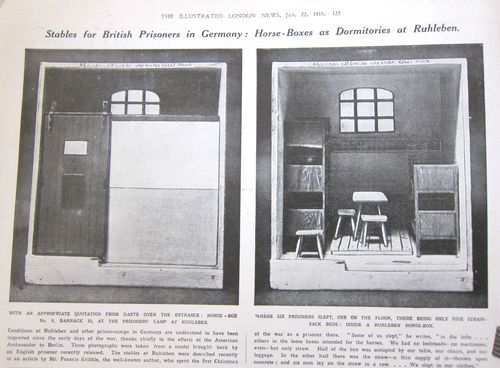JF Ptak Science Books Post 2594

A year and a half into WWI there appeared in the Illustrated London News1 these two pictures of a an internment camp in which British POWs were held. The photos are of a wooden model made by a former internee, Francis Gribble, who also wrote an account of the time he spent there2. The "dormitories" at the German city of Ruhleben had previously been horse stalls, 6'x8' enclosures which slept and kept five or six soldiers. I include info on Gribble below, as well as a link for the full text of Gribble's account.
It seems as though horse stalls were a common convert for concentration and internment camps of one form or another, including here in the U.S. when 120,000 Japanese were rounded up, shipped off, and jailed during WWII. One of the first stops for the "internees" was Tanofran3 race track in San Bruno, San Francisco, California, where Japanese immigrants and Japanese-American U.S. citizens alike were kept in horse stalls and barracks before being shipped off to more permanent facilities out in the middle of nowhere.
There's something about the "race" in "racetrack" that seems very peculiarly ironic.
Notes:
1. Illustrated London News, January 22, 1916, page 122.
2. "Leaves from a Ruhleben Notebook" by Francis Gribble in FORTHNIGHLY REVIEW, Jan. 1916 Source for full text: http://library.nelincs.gov.uk/c/document_library/get_file?uuid=0373113d-9204-4040-933c-79de78f7d1fa&groupId=10158
Francis Gribble
Source: THE RUHLEBEN STORY http://ruhleben.tripod.com/id7.html
Francis Gribble was an inmate at Barrack 5 in Ruhleben. He wrote a short essay entitled "Leaves From a Ruhleben Notebook" outlining his experiences whilst interned, including the witnessing of a fellow inmate's suicide. This was advertised as being printed within "The Fortnightly Review" of January 1916, the advert appearing in the Times of January 3rd 1916 (p.4, col.B).
Articles in the Scotsman newspaper of December 3rd 1915 (p.6) and December 4th 1915 (p.11) outline some of Gribble's observations whilst in Ruhleben for an article forNineteenth Century magazine, entitled Germany Seen from an Internment Camp".
Documents from 1915 concerning Gribble are held at the National Archives in London, at FO383/26 and at FO383/27, including an enquiry from his wife, Eva Gribble, in Holland, regarding his possible inclusion in an exchange of invalided civilians in the camp.
Gribble was released pre-1917 and was further noted in Times of February 17th 1917 as preparing to take part in a demonstration of relatives and friends of the Ruhleben interned at Kingsway Hall on February 26th (p.11, col. G). A summary of the meeting was later carried in the paper on February 27th 1917 ("British Prisoners in Germany", p.5, col. B).
On November 28th 1919, the Times carried an advert for Gribble's book, "The History of Ruhleben", co-written with Joseph Powell (p.18, col. A).
A further book, "Seen in Passing", also including a vivid description of Gribble's time at Ruhleben, was advertised for sale in The Times on January 4th 1929 (p. 10, col. A).
Gribble's obituary, as carried in The Times of October 4th 1946, records that he had been interned in Ruhleben as aresult of having been arrested in Luxembourg, where he had been on holiday in 1914 ("Mr. Francis Gribble", p.7, col. E).
3. The San Francisco News April 3, 1942




Comments